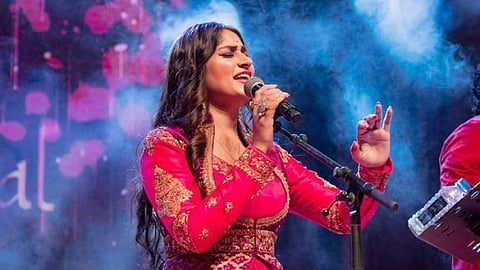

Pratibha Singh Baghel is all set to bring Dastaan-E-Ghazal to Hyderabad on June 21 at Shilpakala Vedika, and she couldn’t be more excited. For her, Hyderabad is not just another venue, it’s a city that truly values Urdu poetry, ghazals and good music. With personal ties and childhood friends here, performing in Hyderabad feels special. CE caught up with the versatile singer about the concert, her journey, creative process and more.
Excerpts
What can Hyderabad audiences expect from your performance at Dastaan-E-Ghazal?
Well, Dastaan-E-Ghazal is being revised and coming back, and I am very, very excited and happy to bring it back. What better place to start than the City of Nawabs, Hyderabad, where ghazal, Urdu poetry and Mausiqui are truly valued, and people are well-read and connoisseurs, if I may say so. Dastaan-E-Ghazal has everything an audience would not want to miss — from Urdu poetry and ghazals to film songs, classical thumris, a few originals and even some beautiful fusions with Deepak Pandit ji. We have brilliant musicians, special jugalbandis and some surprises the audience will love.
Could you share a special connection with Hyderabad and your favourite food from the city?
Well, I think Hyderabad’s biryani is everyone’s favourite and it’s mine too. But my connection with Hyderabad is more personal because I have a few very dear childhood friends who live there, and whenever I visit, I make sure to meet them. That bond goes a long way back. Apart from that, Hyderabad has always been brilliant in the way it receives artists. There are so many cities where you have to think twice before planning a concert, but Hyderabad is not one of them because with good music, you simply cannot go wrong with the people here.
What draws you to the ghazals, and how do you keep it engaging for a younger audience?
We’ve named this concert Dastaan-E-Ghazal because it all started with ghazals for us. Now, the idea is how to bring in the younger audience as well. For that, we’ve added some great fusion elements to the concert, where you’ll find poetries that reflect universal feelings like love and heartbreak. Whether it’s a child, an old person, someone young, from this country or another, or of any gender, love is a feeling that touches everyone. It’s boundless. Poetry has that effect — it speaks to the heart, whether it’s a young heart or an old one. So, we’ve included some interesting twists in the show to keep the younger audience engaged throughout, not just the older ones who already appreciate ghazals and our style of music. The aim is to keep the approach very modern and contemporary so that anyone who wants to pursue music or simply enjoy good music feels drawn to it.
When and how did your journey with music begin?
Music is something I have inherited; it comes from my family. My father is a very good singer, and my uncle, the late Vijay Bahadur Singh ji, was a tabla player and a tabla professor. Professionally, it all began in Indore with a competition called ‘The Lata Mangeshkar Alankaran Award’. Then I gave the Sa Re Ga Ma Pa auditions and moved to Mumbai. That is where Bollywood began for me, singing for Sanjay Leela Bhansali ji, AR Rahman saheb, Shankar Mahadevan ji, Salim–Sulaiman ji and Vishal–Shekhar. I am basically from Rewa, but my journey started from Rewa to Indore to Mumbai.
How has your style or approach to singing evolved over the years?
Earlier, I used to feel quite anxious, constantly chasing Bollywood music. But things have changed now. I feel content with what I’m doing and truly grateful to God for giving me music. I don’t want to limit myself to Bollywood. People have embraced my ghazals with love, so I want to continue nurturing ghazals, thumris, and Indian classical music, while I would always love making music for Bollywood. I’ve collaborated with Budapest Symphony Orchestra, Vienna Philharmonic Orchestra, and Grammy-winning artists like Béla Fleck, Gary Husband and others on ghazal projects with sufi score.
What is your creative process like?
I always sit with my team, rehearse, ideate and take creative inputs from every musician and the music composer who arranges the show. But honestly, I am constantly in the zone whether I am in the kitchen, at the dining table or even in the washroom, always thinking about the show, what can or cannot be done and where which idea can be applied, because if I have a concert, my mind just keeps working 24/7.
Are there any upcoming projects or collaborations?
We’ve just shot a very special project at the Nita Mukesh Ambani Cultural Centre, Mumbai and another one with the Vienna Philharmonic Orchestra.
One message you would like to give young singers out there who would like to explore the classical and semi-classical genre?
Whatever you do, just know the basics of the art because that will make it better and easier for you, and keep discipline, devotion to your art and a lot of reality, this will help you solve your problems.